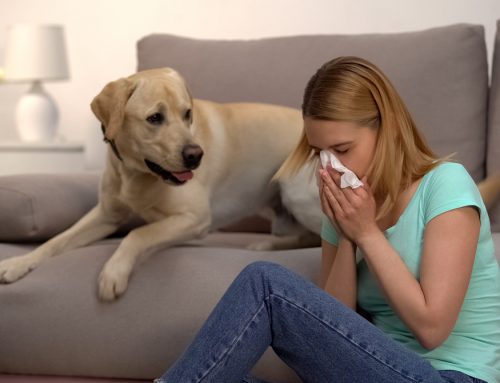It is virtually impossible to turn on the television at night for more than one hour and not see a commercial for the treatment of IBS. What most people don’t recognize is that IBS can also be present in animals.
Irritable bowel syndrome (IBS) is a common chronic functional gastrointestinal condition that is usually characterized by abdominal pain, bloating, and disturbed defecation. Falling under the scope of “abdominal pain”, “diarrhea”, or “constipation,” in Holistic Medicine, it exists worldwide with a relatively high prevalence.
Because its recurrent symptoms severely affect the quality of life of patients, it drives them to consult extensive medical and veterinary resources. A great amount of epidemiological research from various countries at different times has revealed that the prevalence and distributing characteristics of IBS vary according to different countries, regions, and populations in humans. According to the Rome III diagnostic criteria, the global IBS prevalence is between 5% and 20% in humans. Statistics for animals remain unclear and I could find no reference material for this article as to the percentage of animals effected by IBS.
The pathogenesis of IBS remains unknown. However, during recent years, physiological research has increasingly indicated that multiple factors, such as genetic factors, diet, infections, immunity, and the brain-gut axis, can combine in a complex manner, leading to the visceral hypersensitivity and gastrointestinal dysmotility that are manifested by the corresponding symptoms of IBS.
Acupuncture is a crucial part of Holistic Veterinary Medicine. As external treatments of Holistic Veterinary Medicine, acupuncture acts by stimulating acupoints to unblock the meridians and collaterals, regulating the function of qi and blood, supporting health and expelling pathogens. When acupuncture needles are inserted into acupoints, needling manipulations, such as twirling and lifting-thrusting needles, are usually adopted to treat diseases. Thus far, a large number of studies have proven the efficacy of acupuncture in attenuating the symptoms of IBS without producing obvious adverse effects. Meta-analyses have also revealed that the therapeutic efficacy of acupuncture plus is better than that of Western medications for IBS. One clinical study also showed that acupuncture enhanced and extended the prescribed regimen’s efficacy in treating IBS. As its therapeutic efficacy has been confirmed, the action mechanisms of this traditional therapy have become the focus of much current research.
Dr. Sarah Kalivoda
Mountain View Animal Hospital & Holistic Pet Care
Reno, Nevada
775-853-6900
References
- He WR, Zhang FC, Liang LX. The epidemiology of irritable bowel syndrome. Weichangbingxue He Ganbingxue Zazhi. 2012;21:83–85.
- Camilleri M. Peripheral mechanisms in irritable bowel syndrome. N Engl J Med. 2013;368:578–579.[PubMed]
- Matricon J, Meleine M, Gelot A, Piche T, Dapoigny M, Muller E, Ardid D. Review article: Associations between immune activation, intestinal permeability and the irritable bowel syndrome. Aliment Pharmacol Ther. 2012;36:1009–1031. [PubMed]
- Spiller R, Lam C. An Update on Post-infectious Irritable Bowel Syndrome: Role of Genetics, Immune Activation, Serotonin and Altered Microbiome. J Neurogastroenterol Motil. 2012;18:258–268.[PMC free article] [PubMed]
- Lee H, Park JH, Park DI, Kim HJ, Cho YK, Sohn CI, Jeon WK, Kim BI, Chae SW. Mucosal mast cell count is associated with intestinal permeability in patients with diarrhea predominant irritable bowel syndrome. J Neurogastroenterol Motil. 2013;19:244–250. [PMC free article] [PubMed]
- Anastasi JK, McMahon DJ, Kim GH. Symptom management for irritable bowel syndrome: a pilot randomized controlled trial of acupuncture/moxibustion. Gastroenterol Nurs. 2009;32:243–255. [PubMed]












Leave A Comment